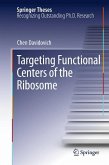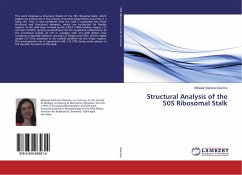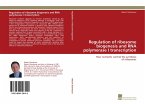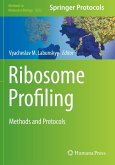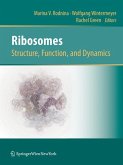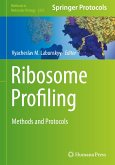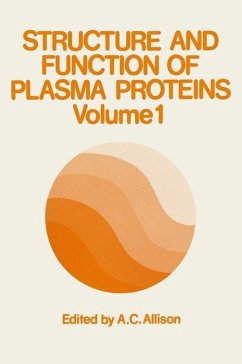Seit 30 Jahren beschäftigt sich Knud Nierhaus mit dem Ribosom. In diesem Band fügt er, unterstützt von erfahrenen Fachleuten aus verschiedenen Disziplinen, die gegenwärtig gesicherten Erkenntnisse über Struktur und Funktion dieses größten in lebenden Zellen existierenden Enzymkomplexes zu einem beeindruckenden Porträt zusammen. Erwogen werden nahezu sämtliche denkbaren Aspekte des Themas, wobei sich Antworten auf manche schon vor Jahrzehnten gestellte Frage ergeben. Ein Muss für Molekularbiologen, Biotechnologen, Pharmakologen und Molekularmediziner!
----------------------------------------
Knud Nierhaus, who has studied the ribosome for more than 30 years, has assembled here the combined efforts of several scientific disciplines into a uniform picture of the largest enzyme complex found in living cells, finally resolving many decades-old questions in molecular biology.
In so doing he considers virtually all aspects of ribosome structure and function -- from the molecular mechanism of different ribosomal ribozyme activities to their selective inhibition by antibiotics, from assembly of the core particle to the regulation of ribosome component synthesis. The result is a premier resource for anyone with an interest in ribosomal protein synthesis, whether in the context of molecular biology, biotechnology, pharmacology or molecular medicine.
AUS DEM INHALT:
History of Protein Biosynthesis and Ribosome Research (H.-J. Rheinberger)
Structure of the Ribosome (G. Blaha)
Assembly of the prokaryotic ribosome (K. H. Nierhaus)
Eukaryotic Ribosome Synthesis (D. Lafontaine)
tRNA: Structure and function (V. Marquéz)
Aminoacylations of tRNAs: Record-keepers for the Genetic Code (L. Ribas de Pouplana and P. Schimmel)
mRNA Decay and RNA-degrading Machines in Prokaryotes and Eukaryotes (A. J. Carpousis and M. Dreyfus)
tRNA Locations on the Ribosome (K. Nierhaus)
Initiation in eubacteria (D. Wilson)
Mechanism and Regulation of Initiation in Eukaryotes (T. E. Dever, A. G. Hinnebusch and N. Sonenberg)
The Elongation cycle (K. H. Nierhaus)
Termination and ribosome recycling (D. Wilson)
The Mechanism of Recoding in Pro- and Eukaryotes (E. S. Poole, L. L. Major, A. G. Cridge and W. P. Tate)
Regulation of the ribosomal components in bacteria (S. Connell)
Antibiotics: Inhibitors of the Translational Apparatus (D. Wilson)
Protein folding (J.H. Alix )
----------------------------------------
Knud Nierhaus, who has studied the ribosome for more than 30 years, has assembled here the combined efforts of several scientific disciplines into a uniform picture of the largest enzyme complex found in living cells, finally resolving many decades-old questions in molecular biology.
In so doing he considers virtually all aspects of ribosome structure and function -- from the molecular mechanism of different ribosomal ribozyme activities to their selective inhibition by antibiotics, from assembly of the core particle to the regulation of ribosome component synthesis. The result is a premier resource for anyone with an interest in ribosomal protein synthesis, whether in the context of molecular biology, biotechnology, pharmacology or molecular medicine.
AUS DEM INHALT:
History of Protein Biosynthesis and Ribosome Research (H.-J. Rheinberger)
Structure of the Ribosome (G. Blaha)
Assembly of the prokaryotic ribosome (K. H. Nierhaus)
Eukaryotic Ribosome Synthesis (D. Lafontaine)
tRNA: Structure and function (V. Marquéz)
Aminoacylations of tRNAs: Record-keepers for the Genetic Code (L. Ribas de Pouplana and P. Schimmel)
mRNA Decay and RNA-degrading Machines in Prokaryotes and Eukaryotes (A. J. Carpousis and M. Dreyfus)
tRNA Locations on the Ribosome (K. Nierhaus)
Initiation in eubacteria (D. Wilson)
Mechanism and Regulation of Initiation in Eukaryotes (T. E. Dever, A. G. Hinnebusch and N. Sonenberg)
The Elongation cycle (K. H. Nierhaus)
Termination and ribosome recycling (D. Wilson)
The Mechanism of Recoding in Pro- and Eukaryotes (E. S. Poole, L. L. Major, A. G. Cridge and W. P. Tate)
Regulation of the ribosomal components in bacteria (S. Connell)
Antibiotics: Inhibitors of the Translational Apparatus (D. Wilson)
Protein folding (J.H. Alix )
"Den Herausgebern ist es gelungen, mit ihren Beiträgen und durch die Auswahl kompetenter Autoren eine Monographie vorzulegen, die wie aus einem Guss wirkt. Das Buch ist nicht nur für Spezialisten auf dem gebiet der proteinsythese zu empfehlen, sondern gehört als ein Standard-Nachschlagewerk in die Regale jeder biochemischen und molekularbiologischen Institutsbibliothek. einmal kennengelernt wird dieses Buch Studenten und Wissenschaftler, die sich mit Transplationsvorgängen befassen, über Jahre begleiten. "
Angewandte Chemie und Angewandte I.E.
"Bleibenden Wert werden die ausführlichen Literaturangaben haben."
BDI aktuell
Angewandte Chemie und Angewandte I.E.
"Bleibenden Wert werden die ausführlichen Literaturangaben haben."
BDI aktuell


